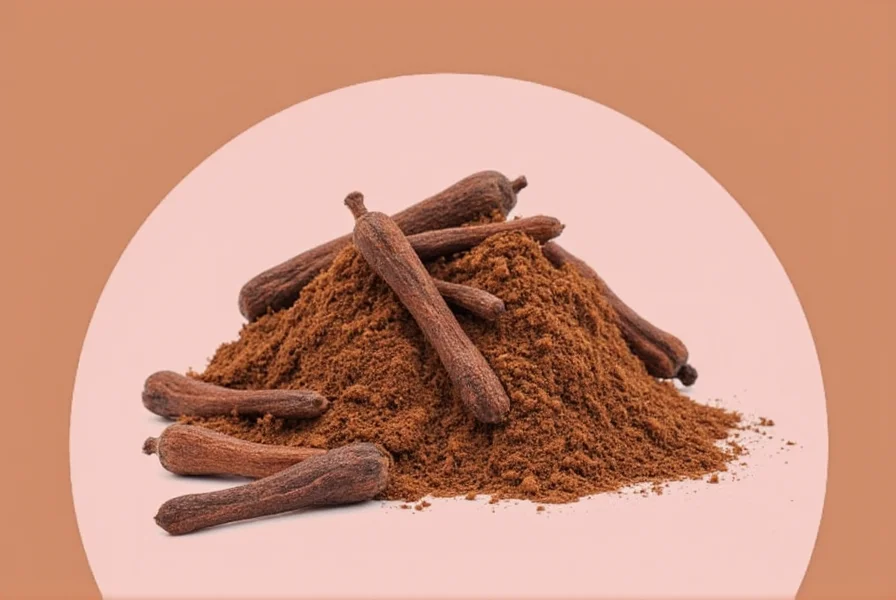Need a quick clove substitute? You don't need to run to the store—these 10 proven alternatives work perfectly in baking, cooking, and drinks. Below are exact ratios, recipe-specific tips, and expert advice to replace cloves instantly.
Top 10 Clove Substitutes with Exact Ratios
| Substitute | Flavor Profile | Best For | Recommended Ratio |
|---|---|---|---|
| Allspice | Jammy, peppery blend of cinnamon, nutmeg, and cloves | Pies, holiday cakes, Caribbean dishes | 1:1 ground for ground cloves |
| Nutmeg | Nutty, creamy warmth | Desserts, custards, eggnog | ½ tsp nutmeg = 1 tsp cloves |
| Cinnamon | Sweet, warm, earthy | Baked goods, stews, mulled wine | 1:1 ground for ground cloves; ½ tsp ground = 1 whole clove |
| Star Anise | Liquorice-like sweetness | Red braises, mulled drinks, Asian curries | 1 pod = 6-8 whole cloves |
| Cardamom | Fragrant, citrusy, floral | Chai, rice pudding, Middle Eastern dishes | ½ tsp ground = 1 tsp cloves |
| Mace | Delicate clove-like warmth | Custards, soups, white sauces | ¼ tsp mace = 1 tsp cloves |
| Pumpkin Pie Spice | Mixed fall spices (cinnamon, nutmeg, ginger, cloves) | Pies, muffins, oatmeal | ¾ tsp = 1 tsp cloves |
| Ginger | Peppery, sharp | Stir-fries, chai, gingerbread | ½ tsp fresh grated = 1 tsp ground cloves |
| Anise Seeds | Black licorice notes | Italian biscotti, broths, Scandinavian baked goods | 1 tsp = 1 tsp ground cloves |
How to Use Substitutes in Specific Recipes
- Apple Pie: Use ¾ tsp allspice or ½ tsp cinnamon + ¼ tsp nutmeg per 1 tsp cloves. Replace whole cloves with 1 star anise pod (remove before serving).
- Gingerbread: Allspice (1:1) or cinnamon (1:1) works best. For depth, add ¼ tsp nutmeg.
- Indian Curries: Star anise (1 pod for 6-8 whole cloves) or cardamom (½ tsp ground per tsp cloves).
- Mulled Wine: Cinnamon sticks (1 stick = 1 tsp ground cloves) or star anise (1 pod per cup of wine).
- Custards: Mace (¼ tsp per tsp cloves) or nutmeg (½ tsp per tsp cloves) for subtle warmth.
Frequently Asked Questions
What is the best substitute for cloves in baking?
Allspice is the top choice for baking. Its flavor combines cinnamon, nutmeg, and cloves. Use 1:1 ground allspice for ground cloves. For richer results, mix equal parts allspice and nutmeg.
Can I substitute cinnamon for cloves?
Yes. Use 1:1 ground cinnamon for ground cloves, or ½ tsp ground cinnamon for 1 whole clove. Cinnamon works well in baked goods, stews, and mulled wine but lacks cloves' medicinal note.
What spice is closest to cloves in flavor?
Allspice is the closest match, as its name suggests it tastes like a blend of cloves, cinnamon, and nutmeg. Mace is also similar (from the same plant family as nutmeg). Use allspice 1:1 or mace ¼ tsp per tsp cloves.
How much cinnamon equals 1 clove?
For ground cloves, use 1 tsp cinnamon. For whole cloves, use ½ tsp ground cinnamon. Cinnamon sticks: 1 3-inch stick ≈ 1 tsp ground cinnamon or 6-8 whole cloves.
Can I leave out cloves in a recipe?
Yes, but it will change the flavor. For best results, replace with substitutes. If omitting, increase cinnamon by 25-50% to compensate for missing warmth.
Quick Reference Tips
- Ground vs. Whole: Ground spices infuse faster—add early in cooking. Whole spices like star anise should be added at the start of long-cooking recipes and removed before serving.
- For Whole Cloves: Use a tea bag or cheesecloth pouch to avoid stray pieces in dishes.
- Where to Find Substitutes: Allspice, cinnamon, and nutmeg are in most grocery stores. Star anise and cardamom are available in Asian markets or online retailers like Penzeys.
Pro Tip: Keep a printed clove substitution chart in your spice drawer for quick reference. No more last-minute recipe panic!











 浙公网安备
33010002000092号
浙公网安备
33010002000092号 浙B2-20120091-4
浙B2-20120091-4